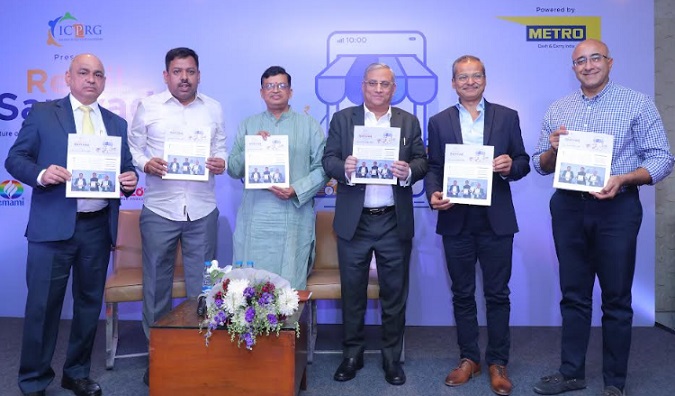
In line with the ongoing initiatives to support MSMEs and Small Retailers in country, India Center for Policy Research and Governance (ICPRG) in association with METRO Cash & Carry India in collaboration organized the sixth edition of the Retail Samvad, titled – Future of Small Retail: Building enabling ecosystem for small retailers & MSMEs to make them future-ready. The deliberations revolved around the changing paradigm of the retail sector with the influx of new-age technologies and digitization and how the sector can assist India to realize its ambition of becoming a 5 trillion-dollar economy.
 |
Dr. SP Sharma, Mr. Aditya Jha, Shri Gopal Krishna Agarwal, Mr. Arvind Mediratta, Mr. Lalit Agarwal, Mr. Rajat Wahi unveiling the recommendation report of Retail Samvad 5.0
Inaugurating the event, Shri Gopal Krishna Agarwal, BJP National Spokesperson, and UP BJP Executive Member commented, ”It is only through debate and discussion that the truth is revealed. Retail Samvad stands as a testimony to this particular idea mentioned in ancient Indian literature. There is increasing encouragement by the government to conduct meaningful discussions with the stakeholders keeping in mind their aspirations and perspectives. The government believes that both entrepreneurship and self-employment are extremely crucial considering the overall contribution of MSMEs to the Indian economy. The Government has been seeking suggestions from stakeholders for formulating the logistics policy, e-commerce policy, and retail trade policy to create a more enabling system for the ecosystem. In the latest budget, the government has removed 39000 compliance requirements, repealed over 1500 redundant laws, and decriminalized over 3400 laws that were creating hindrances in the growth of MSMEs in the country.”
Commenting on the Enabling environment for Evolving retail businesses, Mr. Lalit Agarwal, MD, V-Mart said, ”The retail industry is currently undergoing a disruption of sorts. Consumer behavior is continuously evolving and that is where small retailers are facing problems. Firstly, retailers are facing roadblocks when it comes to keeping pace with fast-changing consumer preferences. Secondly, retailers are also finding it difficult to manage costs as margins are often minuscule. The Government is undertaking a lot of measures but much more needs to be done in the retail space. Further, India is currently not consuming and that will only change, once per capita incomes increase in the coming years.”
Speaking about the retail sector, Mr. Arvind Mediratta, MD & CEO of METRO Cash & Carry India, said, “The retail industry has witnessed many seminal events like Demonetization, GST, pandemic in the past couple of years which has boosted the digital economy. Kiranas have been resilient and have modernized into Smart kiranas by adopting digital tools to source supplies more efficiently; digitize their inventories; communicate with customers better; and reimagine the look and feel of their stores. Modernizing and digitalizing operations of small retailers will make them future ready. Hence, the Government needs to ensure easier access to loans under the PM Mudra scheme to facilitate the digitalization and modernization of the sector.”
“It is crucial that the government considers providing an industry status to the retail sector and creating a separate Retail ministry to address the pertinent issues faced by the sector to enhance ease of doing business. We need quick on-ground implementation of the recommendations suggested in the interest of small retailers and MSMEs. A robust and uniform National Retail policy will also provide the requisite level-playing field for both online and offline retailers, which will help in accelerating the growth of the entire ecosystem,” He added.
Speaking on the importance of skilling for small retailers, Nidhi Gautam, Senior Consultant, MSDE said, “Skilling in the retail space is an aspect that cannot be ignored and every stakeholder should collaboratively work towards making skilling aspirational. Industries are free to create their own curriculum and impart training. Small retailers are masters of their craft, therefore upskilling and reskilling strategies should be drawn, and customized to their individual needs. For instance, if a retailer wants to scale up their business, training can be provided to them on how to manage inventory, manage time, package products in a better way, or use tech to reach a wider audience base, among others.”
The conclave was graced by the presence of eminent leaders from the Retail industry, think tanks, experts from the government and policy space, industry associations, corporate leaders, fintech experts, start-ups, economists and industry analysts, and academicians amongst others.






















































